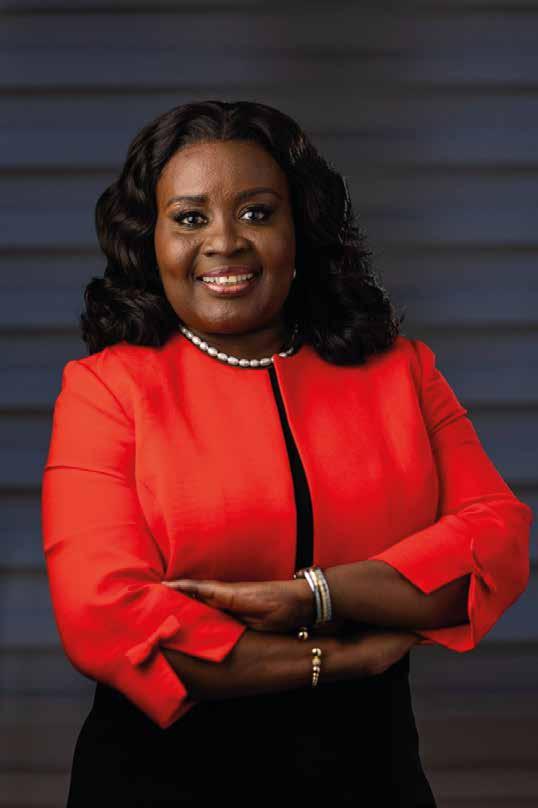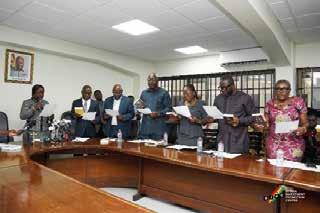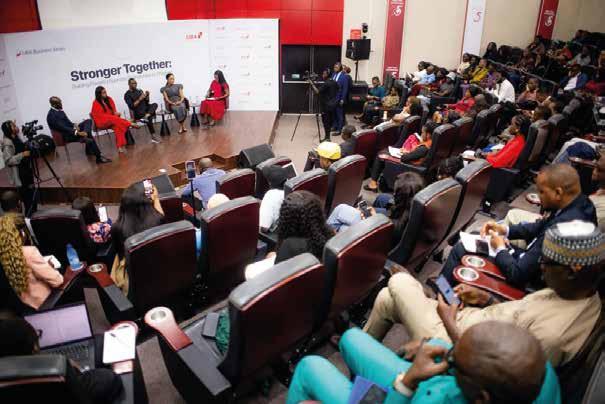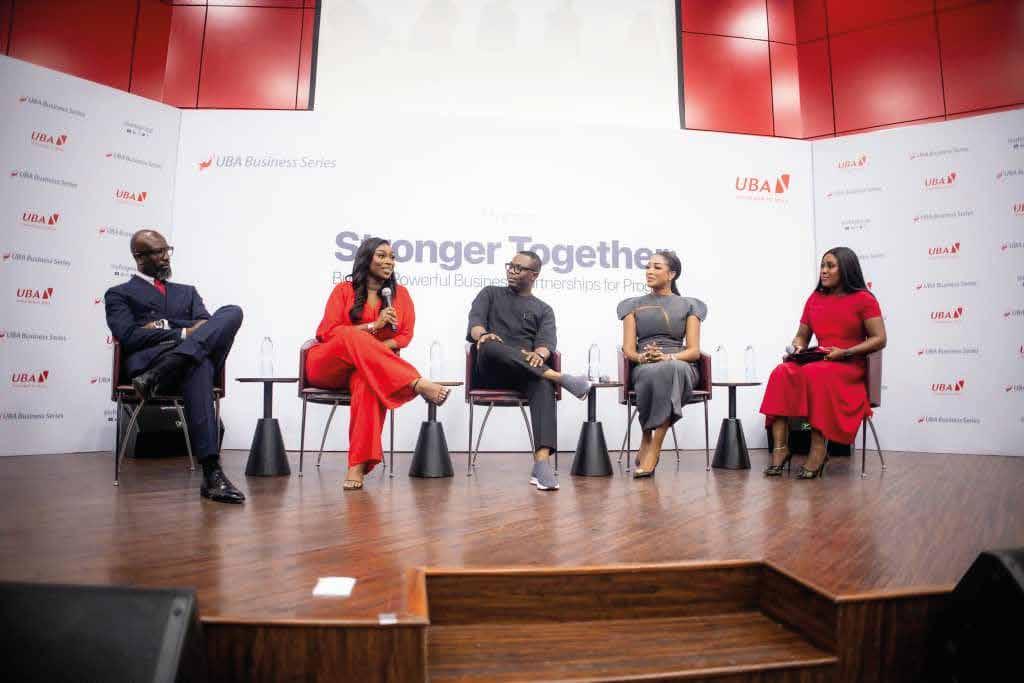

By Nana Essilfuah Boison, Director of Marketing and Corporate A ffairs

Rebuttal

President names new governing board for GIPC



By Nana Essilfuah Boison, Director of Marketing and Corporate A ffairs

Rebuttal

President names new governing board for GIPC

Most of the 13 banks that recorded post Domestic Debt Exchange (DDE) capital deficits have now met or exceeded their recapitalisation requirements at the end of 2024.
This is on the back of strong profitability and Ghana Financial Stability Fund (GFSF) support and are on course to restore Capital Adequacy Ratio (CAR) of 13.0% without reliefs by end-2025.
According to the Country Report by the International Monetary Fund, despite shareholders and/or GFSF capital injections, a few banks (including one state-owned) are materially behind on their recapitalisation schedule.
This is due to slow progress against shareholder capital commitments, higher Non-Performing Loans, and/or delayed booking of credit
impairments and required provisioning identified under Bank of Ghana’s 2023 asset quality assessments.
“These banks are subject to intensified BoG monitoring and corrective measures to accelerate recapitalization plans to reach CAR of 13% (end-March 2025) by end-2025”, it alluded.
It pointed out that a Parliamentary
approval and implementation of the World Bank funded segment of the GFSF could help some banks achieve CAR targets by end-2025.
This is provided that they secure capital injections sufficient to reach capital levels eligible for access.
BoG Intensifies Monitoring of 5 Private and State-Owned Banks
Meanwhile, the
Bank of Ghana has intensified the monitoring of and remedial and/or corrective measures against five private and state-owned banks, which have not complied with the recapitalisation requirements as of end-December 2024.
These banks have fallen behind on their recapitalization schedule due to a mix of unmet capital commitments, increased NPLs, and incomplete booking of credit impairments identified under the BoG’s 2023 asset quality assessments.
In addition, they are implementing updated recapitalization plans accepted by BoG and addressing previous weaknesses and/or more recent performance slippages, towards meeting the end-2025 timeline for full compliance.
By Nana Essilfuah Boison, Director of Marketing and Corporate A ffairs

sheets: the bigger the profit, the greater the success. But today, the metrics have shifted. The most trusted institutions are those that use business as a lever for social change.
Absa Bank Ghana has embraced that
the bank’s purpose, Empowering Africa’s tomorrow, together… one story at a time, the initiative pushes beyond chequebook charity to target real-world transformation in education, entrepreneur-
ReadytoWork: Preparing Youth for the World of Work
Every year, thousands of students complete their studies and step into a labour market that offers few clear pathways. Degrees in hand, many find
themselves underprepared or overwhelmed by the gulf between academic theory and workplace reality.
Absa Bank Ghana is helping to close that gap through its ReadytoWork programme, designed to equip young people with practical skills, digital learning modules, and career guidance.
By September 2024, the programme had reached over 743,000 young individuals through bi-monthly webinars offering practical job market skills. These sessions drew over 737,000 views on platforms like YouTube and Facebook. Additionally, nearly 6,000 tertiary students benefited directly from ReadytoWork modules, helping them navigate the transition from education to employment.
As of July 2025, over 10, 056 students have already directly participated in the programme, while more than 1 million others have engaged with its
content online.
Absa Money Matters: Making Strides in Financial Literacy
There is a moment (often early in life) when a person learns what it means not to have enough. For many teenagers, that moment arrives without warning, often wrapped in anxiety: a school fee unpaid, a family emergency, or simply having to choose between essentials. If we expect young people to make smart financial choices, we must first teach them how money works. That conviction led to the launch of Absa Money Matters in 2024, a financial literacy initiative tailored to senior high schools.
By the end of 2024, more than 101,000 students across the country had taken part, learning how to save and budget. The work continues: as of July 2025, over 57,000 students across 78 schools have joined the programme, each new student a potential shift in generational
thinking.
SME Empowerment: Building Capacity Beyond Capital
Walk through any market – Kejetia, Makola, Tamale Central – and you will find entrepreneurs at work. Beyond capital, many of these SMEs need access to knowledge, networks, and opportunity. Absa Bank Ghana’s SME Clinics are an answer to this need. The clinics are in-person learning series that connect small business owners with seasoned professionals and industry experts. These clinics are spaces for insight, feedback, and practical guidance on navigating business, with topics ranging from financial management to digital marketing. For younger entrepreneurs, access to market is often the missing piece. That is why Absa supported select
startups to showcase their products at Porials Pitch, one of Accra’s fastest-growing shopping bazaars. With footfall in the thousands, the event offered a valuable platform for brand visibility, customer engagement, and sales.
Inspire Me: Expanding Possibilities for Women Entrepreneurs Every year, thousands of women start or grow businesses, often without access to the resources, mentorship, or networks that make sustainable growth possible. Absa Bank’s Inspire Me Conference was created to address these gaps with practical, market-facing solutions.
Inspire Me is a pan-African entrepreneurship platform designed to support women-led businesses with real tools and opportunities. It brings together entrepreneurs, trade
experts, policymakers, and ecosystem leaders for learning, connection, and access. The conference tackles tangible issues – from export readiness and pricing strategy to mental resilience and supply chain opportunities – through masterclasses, panel sessions, and curated networking events. Participants can deepen their skills, build their visibility, and connect with cross-border partners who can accelerate their growth. What makes Inspire Me different is its deliberate focus on market access and scale. Beyond the conference hall, women entrepreneurs engage in B2B trade missions, mentorship programmes, and digital marketplace activations. In 2024, the platform attracted over 1,500 in-person participants
and 10,000 virtual attendees from across Ghana, Kenya, Zambia, Uganda, and Mauritius.
In 2025, the conference will take place in Lusaka, Zambia, from 24 to 25 July, under the theme “Elevating HerStory – United for Purpose.”
Absa Bank’s corporate sustainability is becoming visible in kilowatts saved, waste diverted, and systems redesigned for a lower-impact future.
In 2024 alone, over 1,400 kilograms of paper and nearly 200 kilograms of plastic were kept out of landfills. These figures represent a shift in daily operations: more recycling bins, clearer signage, and staff retraining.
Inside the bank’s buildings, old air conditioners and fluorescent lights are giving way to
inverter systems and LEDs. Thirty-one percent of Absa’s energy efficiency target has already been met, inching towards the 40 percent mark. The bank’s solar rollout tells a similar story. With 8 percent of its 20 percent renewable energy goal achieved, Absa Bank is making deliberate progress towards lighting up its branches with the sun.
Aside from these initiatives, Absa Bank is working to provide potable water to underserved communities through its Water for Life project. In 2024, the bank provided eleven boreholes in needy communities, home to over 30,000 people. This year, ten more boreholes are underway.
Through its Force for Good drive, Absa Bank is investing in the kind of society where banking makes a lasting impact, because every story matters.


Ghana Link Network Services Ltd, operators of the Integrated Customs Management Systems the ICUMS says they have followed with great concern the recent public commentary and media reports, which suggest that scanners at Kotoka International Airport Cargo Village are broken down, and that Ghana is currently relying solely on sniffer dogs to intercept narcotics and contraband.
According to a statement signed by its Head of Public Relations, Norvan Acquah-Hayford, the service provider categorically refute this claim as entirely false, misleading, and damaging to the integrity of Ghana’s border
security systems and the companies entrusted with safeguarding these critical national assets.
All scanners are fully functional There are currently up to five (5) fully functional and operational scanners deployed at Kotoka International Airport Cargo Village belonging to Ghana Link Network Services Ltd.
They are as follows: Export Scanners –Total: 4 Smiths Heimann 180180 2is PRO – Swissport, Smiths Heimann 180180 2is – AGCPC (Air Ghana Cargo Processing Centre), Smiths Heimann 180180 2is PRO –Aviance and Smiths Heimann 180180 2is – Aviance.
All four export scan-
ners are manufactured by Smiths Heimann, France, a globally recognised leader in airport security technology, and are operating at optimal efficiency.
Import Scanner –Total: 1
Rapiscan Eagle A25 – Located at KIA Cargo Section (Import) Manufactured by Rapiscan Systems, which is a combination of Rapiscan and AS&E all from the United States which we have only three in Africa. This high-performance scanner continues to support the detection of inbound contraband, including narcotics, ammunition, and other prohibited items.
Facts on the Ground
All our scanners at Kotoka International Airport Cargo Village are fully functional
and operational. The standard procedure for cargo handling is that all goods arriving by air cargo are moved from the tarmac directly to the scanning machines, where they undergo mandatory scanning before being released to Customs.
All goods to be exported out of the country, also arriving at the cargo village, undergo mandatory customs examination and documentation before they undergo scanning after which goods are released to the high security biometric warehouse, and later transferred to be emplaned. Occasionally, and at the discretion of the Narcotics Control Commission (NACOC), sniffer dogs are deployed as an additional layer of scrutiny, sometimes even before goods are scanned, based on
specific intelligence leads.
In the recent case being discussed, it is our understanding that NACOC had credible intel and, therefore, deployed dogs to where suspicious items were flagged even before the goods could be brought for scanning.
Grave Concerns
We are deeply alarmed by the inaccurate and unverified information. The assertion that “all scanners are broken down” is not only incorrect but also risks:
• Undermining public trust in our port and border security systems.
• Attracting unwarranted scrutiny from international aviation, trade, and security stakeholders.
• Damaging the reputation of companies that undertake Scan and have consistently invested in, supported, and en-
hanced the integrity of these systems at the Airport.
Call for Immediate Rectification
We strongly urge the following:
• The misinformation communicated is corrected.
• We ask that immediate steps be taken to amend the wrong information to reflect the true state of affairs.
• And ask media outlets that published to retract and clarify misleading headlines and articles now circulating both locally and internationally.
Further, the statement noted that the public and relevant institutions that the scanning infrastructure at the KIA cargo village and all other entry/exit points
forms the first line of defence against contraband, including narcotics, arms, and prohibited goods. These systems are not only operational but closely monitored and maintained to ensure compliance with international safety and trade facilitation standards.
Also, were these
scanners to be dysfunctional as claimed, the repercussions in terms of delays, demurrage costs, and compromised perishable cargo would have triggered widespread alarm from freight forwarders, customs agents, and shipping lines alike.
Ghana Link Network Services Ltd remains committed to partnering with the State and its security institutions to enhance Ghana’s border integrity. But this commitment must be reciprocated with truth, accountability, and collaboration, not public misrepresentation.


In line with the GIPC Act and after consultations with the Council of State, President H.E. John Dramani Mahama has appointed a new 10-member Governing Board for the Ghana Investment Promotion Centre (GIPC) to guide its strategic direction and boost its role in fostering economic growth and investment in Ghana.
The board consists of notable individuals from various sectors, including finance, industry, and academia, who will offer strategic advice to the
Akwasi Oppong-Fosu.
Other members include the Deputy Governor of the Bank of Ghana, Dr. Zakaria Mumuni, Dr. Audrey Smock Amoah, Director General of the National Development Planning Commission, Deputy Minister for Trade, Agribusiness and Industry, Hon Sampson Ahi, Deputy Minister of Finance, Thomas Nyarko Ampem, and the CEO of GIPC, Mr Simon Madjie Esq.
The rest are the CEO
dent of the Greater Accra Markets Association, Mercy Afrowa Needjan, Dr. Reuben Owusu Gyamfi, and Major Christine Naa Adoley Oko (Rtd).
This appointment underscores the government’s ongoing dedication to boosting investor confidence, strengthening institutional leadership, and driving Ghana’s industrial transformation.
During the inauguration ceremony in Accra, the Minister of Trade, Agribusi-
ness, and Industry -
beth Ofosu-Adjare, emphasised the Centre's key role in promoting employment and economic growth through strategic Foreign Direct Investment (FDI) initiatives.
She also noted that the review of the GIPC Act highlighted the government's commitment to establishing a more resilient and investor-friendly regulatory framework, stating, “This will ensure that Ghana remains a top destination for high-quality investments.” Chairperson of the Board, Mr. Akwasi
Oppong-Fosu, in his remarks, committed the Board to supporting MOTAI in realising the President’s vision of a transformed Ghanaian economy through strategic investment promotion.
For his part, the CEO of GIPC, Mr. Simon Madjie, described the inauguration of the Board as a significant milestone for the Centre and expressed confidence that their collective expertise will propel the Centre’s efforts to attract substantial foreign investments, fostering economic growth and job creation.
The Ghana Investment Promotion Centre (GIPC) is the foremost investment promotion agency in Ghana, mandated to attract and retain foreign direct investment. GIPC plays a crucial role in facilitating investment projects, providing investor support services, and advocating for policies that enhance the investment climate in Ghana.

At the recent UBA Business Series, entrepreneurs were urged to embrace value-driven partnerships to push growth for their businesses. Held under the theme ‘Stronger Together: Building Powerful Businesses through Partnerships,’ spotlighted the critical roles that value alignment, shared vision, and compatibility play in driving long-term business success for Micro, Small and Medium Enterprises.
The session, which was held at UBA House in Lagos, featured British-Ghanaian Journalist, Peace Hyde, fashion entrepreneur Mai Atafo, beauty entrepreneur, Dabota Lawson and real estate mogul and entrepreneur, Wale Ayilara as panellists. They shared personal experiences and insights on forging strategic alliances that go beyond transactional relationships and lead to exponential growth. Hyde, who ventured into the media
space following the need to tell the African story as it truly is, said there is a need for SMEs to choose partners that add value and align with their business goals. She said, “Partner with those who believe in your current vision, not just where you could be. Money isn’t everything; sometimes distribution or audience access matters more, and choosing the right partners, not just the highest bidder, can lead to global success.”
Lawson, who shared her experience on how her business began as a solution to create beauty products that allowed people to feel included, said that she learnt from her mistakes early enough in the business and began to groom partnerships that added value to her work.
“Early on, I chased exposure, sending products to influencers with millions of followers. But visibility doesn’t always equal sales, and so, I shifted focus to value-driven partnerships: labs for product development, logistics for efficiency, and beauty professionals who align with my brand,” Lawson said.
Ayilara, who ventured into the real estate business at a young age on the university campus, said, “You need to leverage whatever you have. Start small, and co-own
properties with trusted friends. In the university, I pooled funds with classmates to solve accommodation shortages. Real estate is unavoidable, everyone needs it, but risks like scams exist. Research, start modestly, and scale deliberately.”
For celebrity designer Atafo, who left a well-paying job to focus on his business because of his passion and vision. He advised entrepreneurs to set boundaries to avoid conflicts. He also highlighted the key role that research plays in building strong businesses.
Atafo said, “Define boundaries early. Choose your lane, whether it is artistry or profit, and research relentlessly. Assume everything you hear is a lie until you verify it. Inquisitive learning is everything.”
UBA’s Group Head, Retail and Digital Banking, Shamsideen Fashola, who welcomed the panellists
“We are thrilled to host this transformative event here at UBA House and virtually across the continent, as we empower MSMEs with practical strategies to thrive in today’s dynamic
and participants at the event, said the UBA Business Series is a knowledge-sharing platform to empower entrepreneurs and small business owners with the tools, strategies, and insights needed to grow and sustain their businesses.
business landscape. At UBA, our commitment to business development and financial inclusion drives this quarterly series, and we’re excited to bring together brilliant minds and to share insights on the
power of collaboration,” he said.
Group Head of Corporate and Marketing Communications, Alero Ladipo, who appreciated the panellists for the insights shared during the session, said, “One thing that is very intrigu-
ing about this session is that there’s so much to learn, and it’s not just about feeling excited. It’s about you: taking the lessons shared, researching the information, retaining it, and reminding yourself of it.”




The Newmont Ahafo Development Foundation (NADeF), in partnership with the Gold Coast Medical Foundation and Arise to Connect Africa, has organised a free health screening exercise for residents of Kenyasi in the Ahafo Region.
The outreach, which saw participation from over
400 residents, was also supported by the Ntotroso Nursing and Midwifery College a tertiary institution established by NADeF to enhance health training capacity in the region and beyond.
The screening services included malaria testing, blood pressure monitoring, hepatitis B and typhoid screening,
eye examinations, and general medical consultations. While some participants received immediate treatment and medication on-site, others were referred to nearby health facilities for further care.
The initiative forms part of NADeF’s broader strategy to enhance public
health outcomes in its host communities, particularly among populations with limited access to essential healthcare.
Speaking to the media during the event, Executive Secretary of NADeF, Mrs. Elizabeth Opoku-Darko, underscored the Foundation’s continued investment in health and well-be-
ing.
“This annual health screening is part of our strategic efforts to address pressing health needs in our communities. By bringing healthcare services closer to residents, we are promoting early detection and preventive care,” she stated. Mrs. Opoku-Darko also highlighted the value of collaboration in delivering impactful community programmes, noting that strong partnerships remain central to the Foundation’s success in corporate social responsibility (CSR).
NADeF established as the CSR vehicle for Newmont Ahafo Mines has over the years implemented a variety of development interventions across key sectors including education, infrastructure, healthcare, and economic empowerment.

Absa Bank Ghana has officially opened a new branch in Kasoa, reaffirming its commitment to expanding access to financial services.
Situated on New Market Road in Kasoa, the branch provides a full range of services across Retail, Business, and Corporate Banking. It also
offers access to Absa Bank’s products and services, including its SME loan @10% per annum offering in partnership with the Mastercard Foundation.
Speaking at the opening ceremony, Managing Director of Absa Bank Ghana, Mr Edward Nartey Botchway, emphasised the
bank’s confidence in Kasoa’s growth.
“We are not just here to open accounts; we are here to open doors to possibilities because your story matters to us very much at Absa,” he said.
Mr Botchway noted that the decision to re-establish a presence in Kasoa was informed by the
area’s dynamic economic activity and strong entrepreneurial energy. He described the new branch as a symbol of access, connection and long-term commitment.
Also speaking at the event, Retail Banking Director Mr Charles Addo highlighted the importance of the new branch to both
returning and new customers.
“We have listened, solutioned, and we are back, not just to meet expectations but to exceed them,” he said.
“Our solutions, such as Absa Mobi Tap, Absa She Business and our SME Loan @10%, were developed with communities like Kasoa in mind.”
He also announced the introduction of Absa’s agency banking in the area, which allows customers to conduct everyday transactions at selected partner shops in the market without needing to visit the main branch.
Designed with customer convenience at its core, the new Kasoa branch will serve as an anchor point for personal and SME banking support, digital services, and financial advisory, delivered by a dedicated in-branch team.



Fair in 2013, Sarsoli Industries has leveraged the platform to build global partnerships, gain technical insights, and open new regional markets. The company has also expanded exports to Ghana and other ECOWAS countries by utilising trade incentives and aligning with international standards. Highlighting the role of K 2025 in fostering inclusive innovation, Itua
Akhigbe, West African Representative of Messe Düsseldorf (organisers of K) stated, “We’re not just showcasing products at the K Fair; we’re piloting real-world solutions and creating a catalyst for sustainable industry transformation. Exhibitors and visitors return here because K delivers both visibility and value: a platform where sustainable ideas, digital innovation, and
global partnerships take shape.”
At K 2025, Sarsoli will showcase its recent innovations in product development and sustainability. These include high dispersion masterbatches that improve plastic recyclability, digitised production workflows to cut energy use and waste, and recyclable additive solutions aligned with global smart manufacturing
trends. In addition, the company scaled up to produce high-quality calcium carbonate (CaCO3) powder, reducing dependency on imports from countries like Turkey and Egypt. As the plastics and rubber industry faces growing pressure to cut waste, conserve energy, and adopt responsible supply chains, K 2025 stands firm as the global epicenter for dialogue, inno-
vation, and actionable solutions Amid these conversations, the presence of emerging market innovators like Sarsoli Industries reflects the fair’s expanding inclusivity and relevance of African players in global discourse. K 2025 is both a trade fair and a global dialogue; in that dialogue, Nigeria is speaking with clarity, ambition, and innovation.


This October, from 8th to 15th, the global plastics and rubber industry will reconvene in Düsseldorf, Germany for K 2025, the world’s biggest trade fair for plastics innovation, under the theme ‘The Power of Plastics: Green, Smart, Responsible’. Renowned for driving industrial transformation, K is set to break new ground this year with an
ambitious agenda centred on the circular economy, digitalisation, and human-centred manufacturing.
Held every three years at Messe Düsseldorf, the K Fair brings together over 3,000 exhibitors and 220,000 visitors from more than 160 countries. It provides a global stage for product launches, technical exchange, and policy dialogue that
shape the future of plastics. Among the industries it attracts is Nigeria’s petrochemical value chain, drawing hundreds of representatives and stakeholders. In 2025, the platform will once again host a Nigerian masterbatch manufacturer Sarsoli Industries, as an exhibitor. Now marking its fourth consecutive appearance, the participation of
the resilient West African innovator exemplifies a growing trend: African companies are asserting themselves as vital contributors to global industrial transformation.
Over the years, K Fair has become synonymous with international collaboration and actionable discourse in the plastics, rubber and petrochemical industry. What distinguishes K 2025 is its deliberate inclusion of emerging market perspectives, with initiatives and collaborations exploring how plastics can actively support environmental sustainability and biodiversity. Against this dynamic backdrop, Sarsoli Industries, the first-ever Nigerian exhibitor at
the K Fair, returns in 2025 as a key voice from West Africa.
“K has consistently delivered exposure and real industry relevance, connecting us with decision-makers who understand innovation, value sustainability, and shape the future of plastics,” said Jaiprakash Changrani, Managing Director of Sarsoli Industries. “Our continued presence at K reflects our belief that Africa, particularly Nigeria, has a critical voice in that dialogue. This year, we’re proud to again contribute West Africa’s perspective to the global movement toward circularity, digital transformation, and inclusive trade.”
Since debuting at K